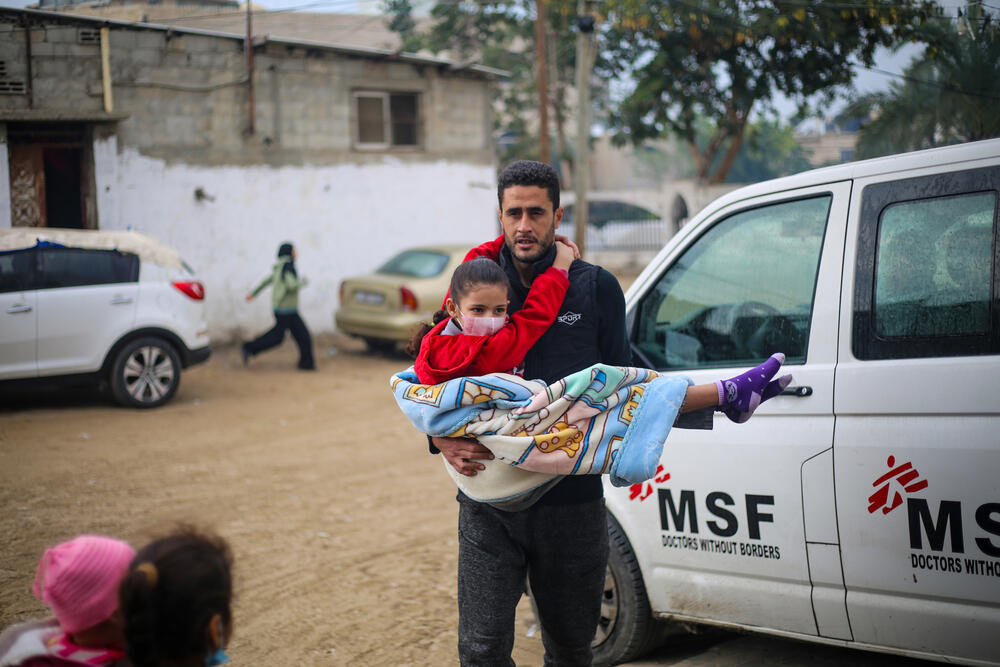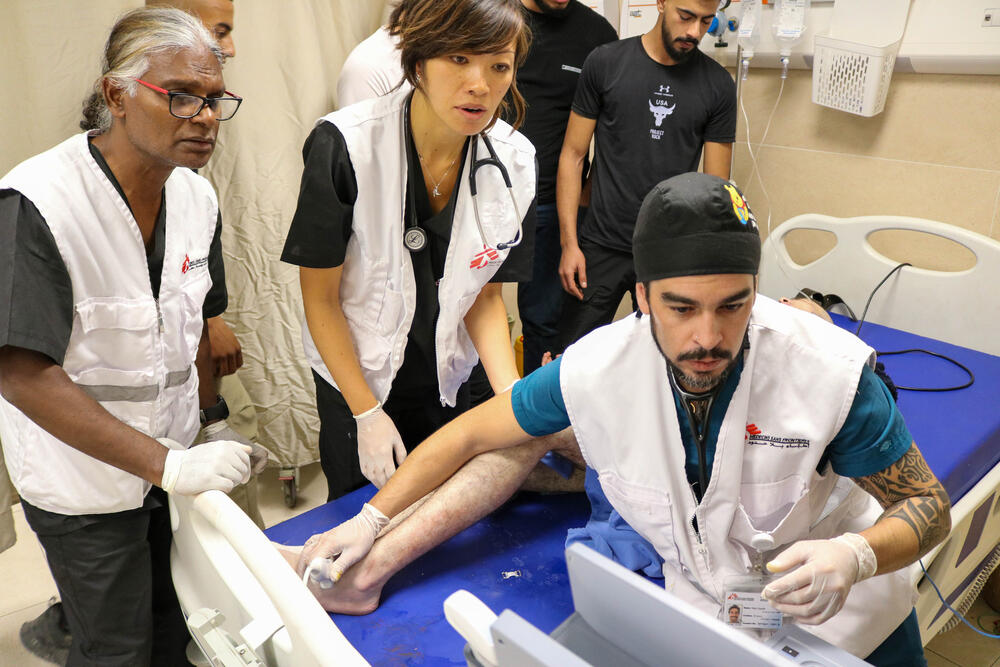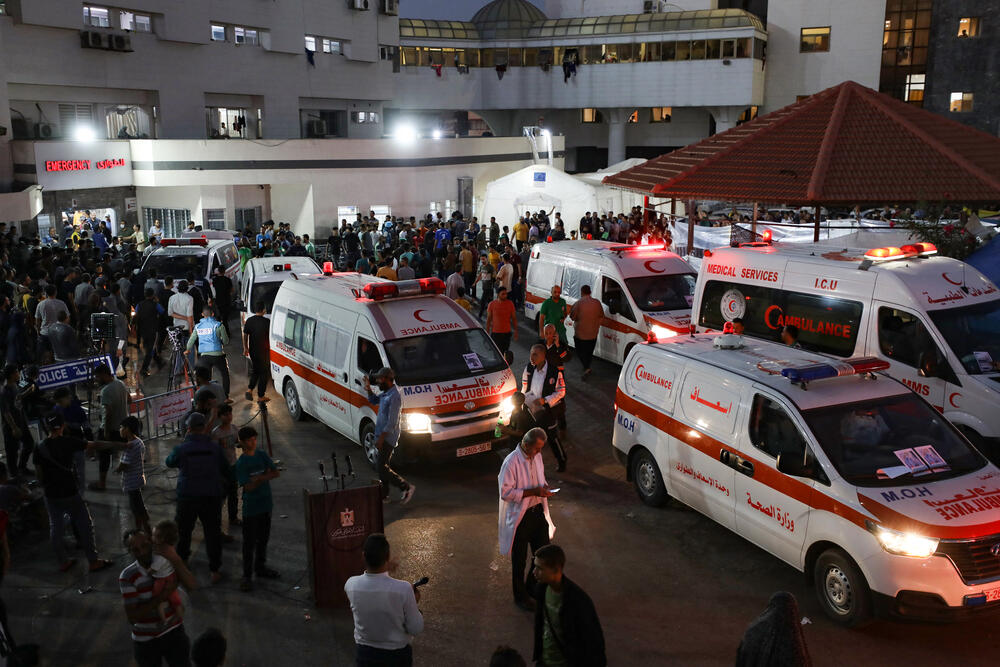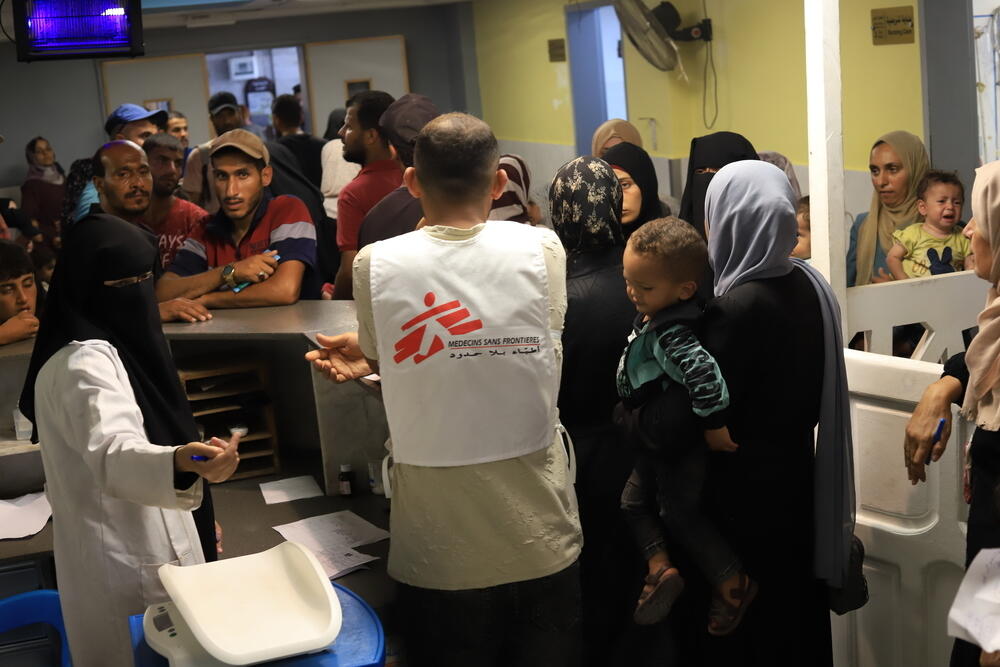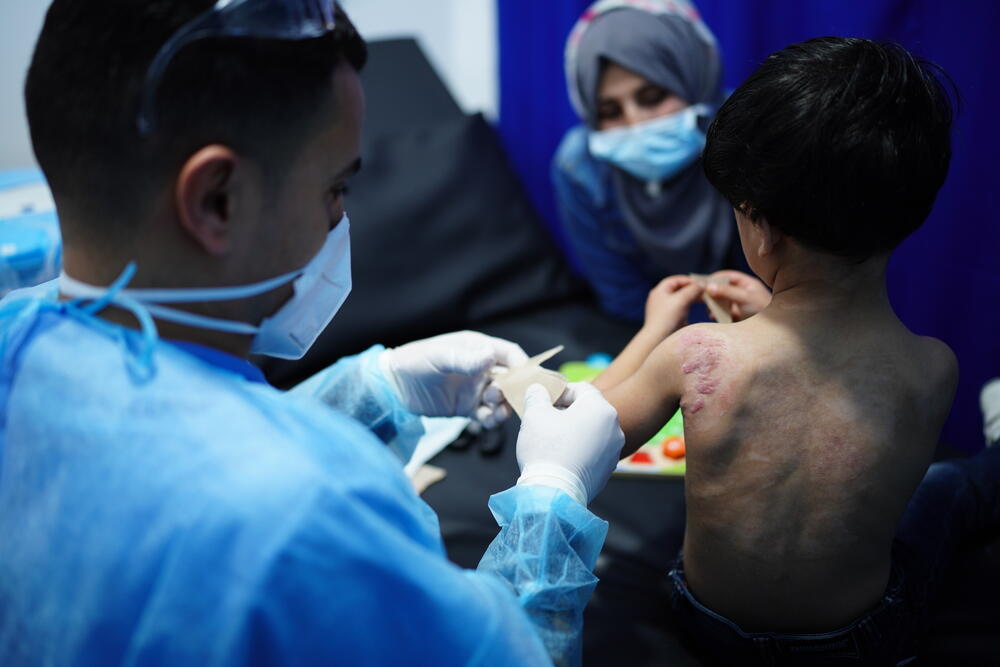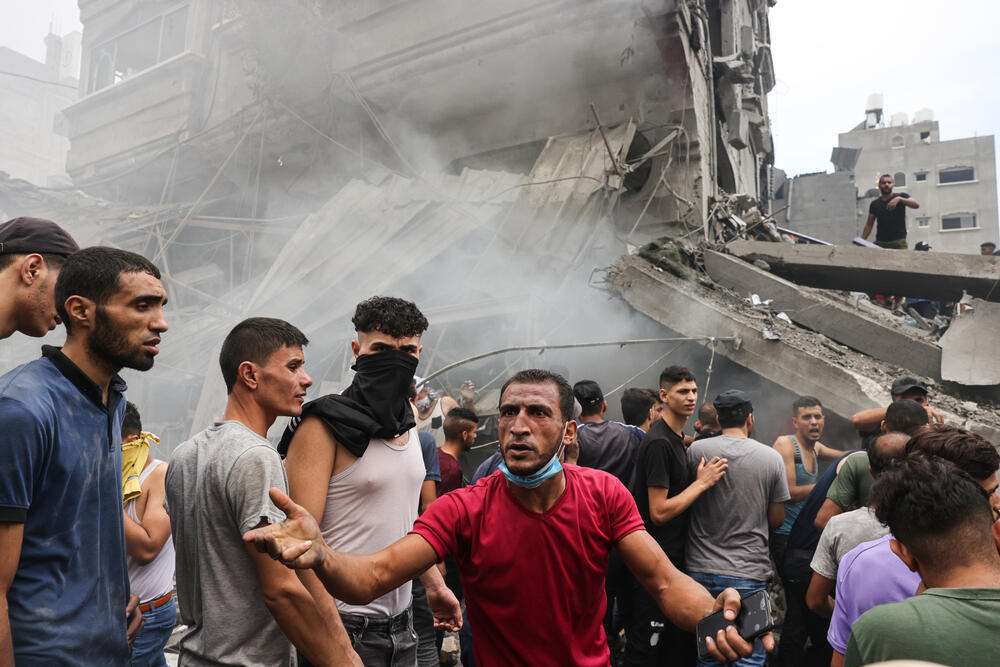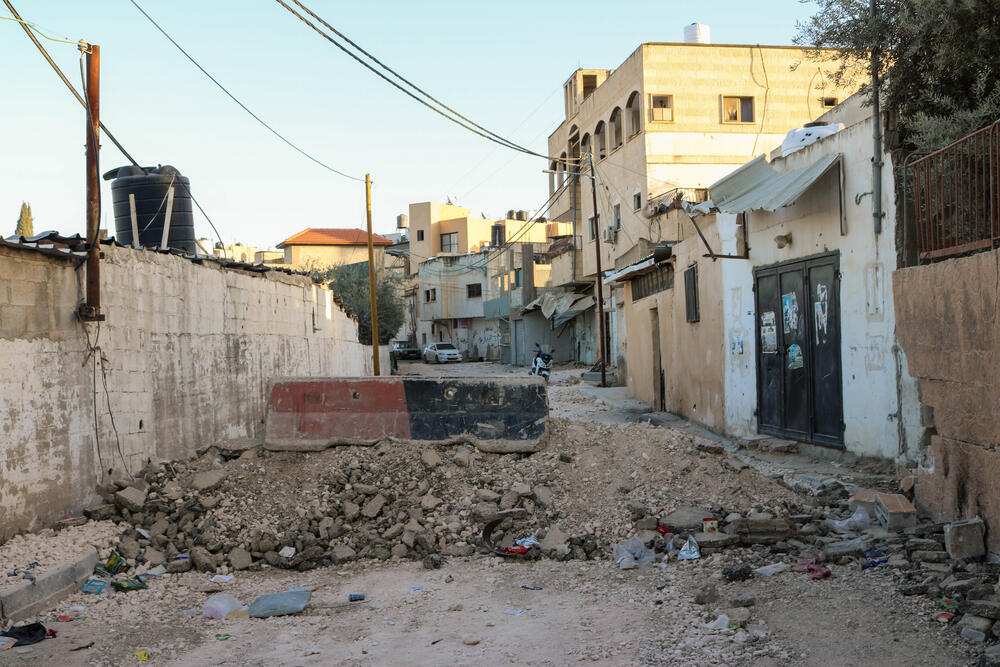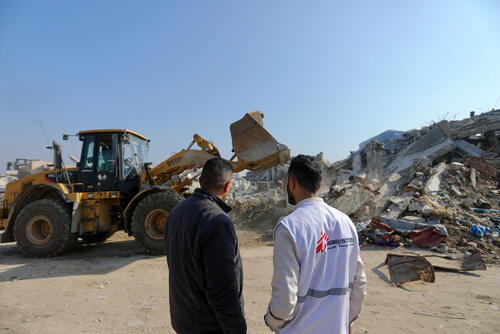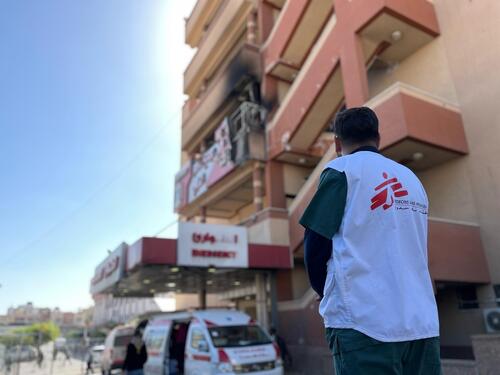Support MSF's regional response to the severe humanitarian crisis in Gaza
Update | Gaza - 18 March 2025
In the early hours of 18 March, Israeli forces attacked multiple areas in the Gaza Strip, after almost two months of an already fragile ceasefire. According to the Ministry of Health, hundreds of people have been killed.
Decades of repression and conflict, and an Israel-imposed blockade from 2007 on the Gaza Strip, Palestine, exploded on 7 October 2023 when Hamas attacked Israel on a large scale. In response, Israel launched massive attacks on Gaza.
More than 46,000 Palestinians have been killed and 111,000 injured, according to Gaza’s Ministry of Health. After month of intense bombardment, an estimated 560,000 people have returned to their homes in north Gaza. Hospitals across the Strip have been damaged and destroyed. Food, water, and medicines are scarce. People are trying to survive in the direst of circumstances.
While this temporary ceasefire brings relief, it is long overdue and not enough to restore Palestinian’s dignity, which has been completely disregarded during the war.
A permanent and sustained ceasefire remains the only solution to ease the suffering of Palestinians..
Donate to the Gaza Emergency Regional Fund
Help provide vital medical care to those who need it most.
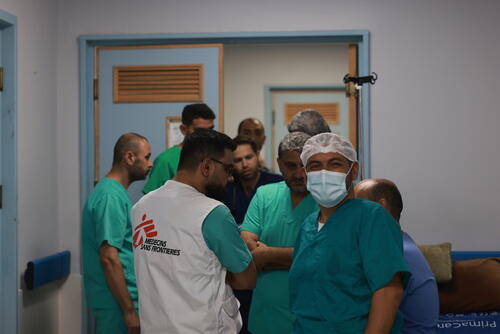
Between 7 October 2023 and 31 January 2025, MSF teams in Gaza have provided
- 549,000 Outpatient consultations
- 124,300 Emergency room consultations
- 34,300 Individual mental health sessions
- 34,200 Patient admitted
- 11,700 Surgeries
- 8,900 Births assisted
Throughout the conflict in Gaza, there have been serious incidents of attacks on hospitals, violence against medical personnel and obstructions to healthcare.
Shockingly, more than 1,042 healthcare workers have been killed between 7 October 2023 and 28 October 2024 - this includes eight of our own staff.
MSF is horrified by these killings, and condemns them in the strongest terms.
Key Information:
The health system is continuously under attack in Gaza. Hospitals and ambulances are under attack, patients and medical staff are being injured and killed. The access to the wounded and sick is impeded by insecurity, lack of fuel and cell phone connectivity.
Most of Gaza’s hospitals are out of service as the electrical power and water have been cut off due to lack of fuel and also to the damage healthcare facilities sustained in multiple attacks. While some hospitals are closed, the others function with very limited resources, often unable to admit new patients due to lack or absence of medical supplies and medication, fuel, food and water. Medical staff working in Gaza are utterly exhausted and do what they can in impossible conditions.
Throughout the war in Gaza, MSF teams have witnessed attacks on health facilities in the Gaza Strip, including raids on hospitals, sieges and the destruction of medical infrastructure and equipment. On several occasions, our teams have also witnessed the detention of medical staff and patients. The healthcare system in Gaza has practically collapsed, while, people’s medical needs are skyrocketing.
Medical staff should not have to choose between saving their own lives and those of their patients.
Staff and patients from MSF have had to leave 14 different health structures and have endured 26 violent incidents (3.7 per month on average), which includes airstrikes damaging hospitals, tanks being fired at agreed deconflicted shelters, ground offensives into medical centres, and convoys fired upon. These attacks show the blatant disregard of medical humanitarian action and failure of deconfliction measures in a war fought with no rules.
Contrary to the repeated public communications of the Israeli authorities, humanitarian aid has been denied or severely impeded since the beginning of the war, making it near impossible to provide even basic healthcare. This is not a logistics problem; it is a political problem.
Instrumentalising aid to falsely create an illusion of safety and minimal service provision in Gaza, in order to maintain the pretence of Israel’s adherence to International Humanitarian Law, is pure propaganda and is only endangering civilians further. Aid, when it is not completely blocked, comes in dribs and drabs, and can in no way adequately meet the immense needs of people in Gaza.
Water supply is critical throughout Gaza. Due to a lack of fuel, desalination plants are operating at a reduced level. There is more imported food available in some markets, where it gets through in private company trucks, but it is unaffordable for most Gazans as prices of basic commodities have skyrocketed.
Northern Gaza remains isolated, receiving negligible amounts of humanitarian aid in contrast to the actual needs. OCHA said in June that the Israeli authorities had facilitated only 49% of the planned humanitarian assistance missions to northern Gaza. The rest were impeded, denied access, or cancelled due to logistical, operational or security reasons.
MSF visits to northern Gaza have illustrated the absence of essential supplies, clear and safe supply routes, and the devastation of numerous hospitals. The recent MSF report denounces Gaza’s “silent killings” from preventable diseases and lack of access to medical care
However, it’s important to note that some medical staff in hospitals like Indonesian hospital and Al Awda hospital continue working to rebuild, refurbish and treat patients. Distribution of aid within the strip from the North to the South and from the South to the North is near impossible.
MSF currently operates in two hospitals (Al-Aqsa hospital, Nasser hospital), two field hospitals, six basic healthcare centres, and two clinics.
Our teams are offering surgical support, wound care, physiotherapy, maternity and paediatric care, basic healthcare, vaccinations, and mental health services. However, Israel’s blockade on Gaza has left hospitals without sufficient supplies despite the massive scale up of services and assistance that is needed.
South Gaza
Nasser hospital, Khan Younis - Nasser hospital is now the largest surgical centre in the Gaza Strip. Working with the Ministry of Health, we focus on providing orthopaedic surgery, and working in the burn unit, providing plastic surgery, general laboratory activities, physiotherapy and supporting the counselling department. We also offer day surgery, provide care in the maternity and neonatal wards, and have opened an inpatient therapeutic feeding centre. We treat admitted patients in a 67-bed inpatient ward, and support the hospital’s mother and child care. We opened an inpatient therapeutic feeding centre for children with malnutrition.
Al-Mawasi advanced healthcare centre, Rafah – We provide outpatient services, including general consultations, vaccinations, reproductive healthcare, wound dressing, mental health services, and health promotion. Our facility also features a 24/7 emergency room for stabilising and referring trauma patients. We are also providing malnutrition screening and outpatient treatment for malnutrition for children and pregnant and lactating women.
Khan Younis healthcare centre, Khan Younis - We provide outpatient consultations, vaccinations, mental health services, outpatient treatment for malnutrition, sexual and reproductive healthcare, wound care, physiotherapy, and health promotion. We also provide a minimal emergency service focused on stabilisation and referral.
Al-Attar healthcare centre, Khan Younis – Opened in mid-June 2024, we offer a range of services, including a 24-hour emergency service, general medicine, paediatric consultations, emergency healthcare, wound care, antenatal and postnatal care, malnutrition treatment, mental healthcare, and health promotion.
Al-Qarara sexual and reproductive health clinic, Khan Younis – We provide medications and financial support to a clinic run by PalMed, a local organisation, which covers sexual and reproductive healthcare, as well as provide general medical consultations and outpatient treatment for malnutrition.
Middle Area
Al-Aqsa hospital, Deir Al-Balah – We provide trauma surgery, advanced wound care, post-operative wound care, physiotherapy, health promotion, and mental health support. We run the hospital’s pharmacy, support severe cases in the emergency department and provide malnutrition screenings and referrals.
Al-Martyrs clinic, Deir Al-Balah - An MSF team provides wound care, mental health support, physiotherapy, health promotion activities, and malnutrition screening.
Al-Hekker clinic, Deir Al-Balah – We provide general consultations, vaccinations, reproductive health services, and change wound dressings. We also provide mental health services, including psychological first aid, individual and family counselling sessions, and psychoeducation and health promotion activities. Our services include outpatient treatment for malnutrition.
Deir Al-Balah field hospital, Deir Al-Balah – Located 250 metres from Al-Aqsa hospital, we run this field hospital to provide extra capacity and support to Al-Aqsa. We treat people on an outpatient basis in an emergency room and an outpatient department, and people on an inpatient basis, with capacity for 70 beds, for those who need to be admitted or require surgery in the operating theatre.
Deir Al-Balah modular field hospital, Deir Al-Balah – Our second field hospital opened next to the first, providing outpatient activities and paediatric hospitalisation.
North Gaza
MSF clinic (near Al-Shifa), Gaza City – In our clinic close to Al-Shifa hospital, our team provides general consultations, screening for non-communicable diseases and malnutrition, as well as antenatal and postnatal care.
Sheikh Radwan healthcare centre, Gaza City – We are training Ministry of Health staff on nutrition and emergency care in the centre, as well as donating supplies.
Water and sanitation
In January, we distributed 500,000 litres of water daily through more than 60 water points in Al-Mawasi, Khan Younis, Rafah, and Deir Al-Balah. We have also begun trucking water in the north of Gaza, and continuously work to increase the quantity of drinkable water in the Strip.
In partnership with a local organisation, Palestinian Agriculture and Development Association (PARC), we are building latrines, distributing hygiene kits, and supporting water treatment units in camp shelters in Deir Al-Balah and Khan Younis.
In the first year of the conflict, MSF delivered 636 tons of logistics and medical equipment (around 130 trucks). This includes medicines, wound dressings, surgical kits, generators and two field hospitals.
However, border restrictions and the limited options for crossing into Gaza have made our supply operations extremely difficult. Our team in Egypt are ready and waiting to send more medical supplies as soon as they can do so safely.
Access to safe, clean drinking water is particularly difficult in Gaza, exacerbating living conditions, hygiene and health issues.
MSF is currently distributing more than 800,000 litres of water per day through a desalination process at more than 64 water points across Al Mawasi, Khan Younis, Rafah, and Deir El Balah.
MSF’s activities in the West Bank have been affected by the escalation of violence and movement restrictions that have limited people’s access to essential services, including healthcare. The impact on our patients' mental health has been a particular concern.
We have responded by expanding our work to reach communities directly, help local emergency services and support healthcare centres and clinics.
This includes:
• Supporting four healthcare centres and running 15 mobile clinics in Hebron, as well as training healthcare staff at Al Moktaseb, Halhoul, Dura, and Yatta hospitals.
• Providing medical supplies to community focal points and emergency centres in Beit Omar, Al Rshaydeh and Um El Khair.
• Providing relief items and food parcels to Gazans displaced within the West Bank.
• Increasing capacity at hospitals including Halhoul, Thabet Thabet, Moktaseb, Jenin, and Khalil Suleiman.
• In Nablus, MSF provides psychological therapy and sexual and gender-based violence services. We also train first responders from the Palestine Red Crescent Society.
• In Jenin and Tulkarem, we train paramedics and volunteers to respond to medical emergencies inside the nearby refugee camps when ambulances are unable to reach patients due to violent incursions.
The conditions in Gaza are only getting worse: more people are injured and dying every day, while medical care is becoming less and less available. Contributions towards the Gaza Emergency Regional Fund will support MSF’s emergency response to this severe humanitarian crisis. MSF’s independence — and your support — will be crucial to our ability to launch lifesaving programs assisting vulnerable people caught in the Gaza emergency.
Latest MSF Updates from Gaza and West Bank:
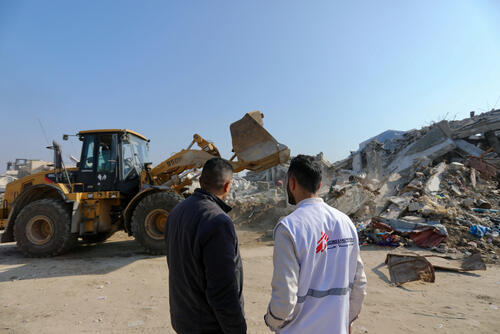
Donate now to our Gaza and West Bank Regional Fund
Since 7 October 2023, more than 1.9 million people have had to flee their homes, with conditions in Gaza constantly deteriorating.
Donations to the Gaza Emergency Regional Fund will fund MSF’s emergency medical response to this horrific humanitarian crisis.
